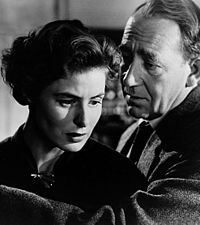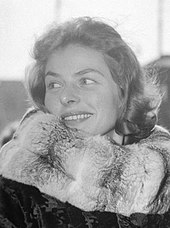Ingrid Bergman
According to Selznick's son Danny, who was a child at the time, his father had concerns about Bergman: "She didn't speak English, she was too tall, her name sounded too German, and her eyebrows were too thick".
This was the "sentiment of the entire set", wrote a retrospective,[vague] adding that workmen went out of their way to do things for her and that the cast and crew "admired the quick, alert concentration she gave to direction and to her lines".
According to Life, the impression that she left on Hollywood, after she returned to Sweden, was of a tall girl "with light brown hair and blue eyes who was painfully shy, but friendly, with a warm, straight, quick smile".
[8]: 88 Despite her personal views regarding her performance, Bosley Crowther of The New York Times wrote that "Bergman was surprisingly lovely, crisp and natural ... and lights the romantic passages with a warm and genuine glow".
[16] James Agee, writing in The Nation, said Bergman "bears a startling resemblance to an imaginable human being; she really knows how to act, in a blend of poetic grace with quiet realism,[42] which almost never appears in American pictures."
[15] On 17 February 1948, Arch of Triumph, by Lewis Milestone was released with Bergman and Charles Boyer as the leading roles[57] Based on Erich Maria Remarque's book, it follows a story of Joan Madou, an Italian-Romanian refugee who works as a cabaret singer in a Paris nightclub.
Bosley Crowther of The New York Times opened his review by writing: "After all the unprecedented interest that the picture Stromboli has aroused—it being, of course, the fateful drama which Ingrid Bergman and Roberto Rossellini have made—it comes as a startling anticlimax to discover that this widely heralded film is incredibly feeble, inarticulate, uninspiring and painfully banal."
"[73] The staff at Variety agreed, writing, Director Roberto Rossellini purportedly denied responsibility for the film, claiming the American version was cut by RKO beyond recognition.
"[78] In an expansive analysis of the film, critic Fred Camper wrote of the drama, Like many of cinema's masterpieces, Stromboli is fully explained only in a final scene that brings into harmony the protagonist's state of mind and the imagery.
Forced to drop her suitcase (itself far more modest than the trunks she arrived with) as she ascends the volcano, Karin is stripped of her pride and reduced — or elevated — to the condition of a crying child, a kind of first human being who, divested of the trappings of self, must learn to see and speak again from a personal "year zero" (to borrow from another Rossellini film title).
[64]: 18 His biographer, Peter Bondanella, notes that problems with communication during their marriage may have inspired his films' central themes of "solitude, grace, and spirituality in a world without moral values".
Bosley Crowther wrote in the New York Times, "It is a beautifully molded performance, worthy of an Academy Award and particularly gratifying in the light of Miss Bergman's long absence from commendable films.
With her role in Anastasia, Bergman made a triumphant return to working for a Hollywood studio (albeit in a film produced in Europe) and won the Academy Award for Best Actress for a second time.
[99] Bergman later starred in the 1958 picture The Inn of the Sixth Happiness, based on a true story about Gladys Aylward, a Christian missionary in China who, despite many obstacles, was able to win the hearts of the natives through patience and sincerity.
Howard Thompson wrote in The New York Times: The teaming of Matthau, whose dour, craggy virility now supplants the easy charm of Barry Nelson, and the ultra-feminine Miss Bergman, in a rare comedy venture, was inspirational on somebody's part.
The New York Times in its review wrote, "Striving mightily and looking lovely, Miss Bergman seems merely a petulant woman who falls into the arms of Quinn for novelty, from boredom with her equally bored husband, [Weaver], pecking away on a book in their temporary mountain retreat.
[142] In the late '70s, Bergman appeared on several talk shows and was interviewed by Merv Griffin, David Frost, Michael Parkinson, Mike Douglas, John Russell and Dick Cavett, discussing her life and career.
"[154] Although post-war social conservate morals stoked the public outrage, another factor was the Bergman's on-screen image as a pure, saint-like character; she later commented: "People saw me in Joan of Arc, and declared me a saint.
In attendance were her children, the Rossellinis, and relatives from Sweden, as well as numerous fellow actors and costars, including Liv Ullmann, Sir John Gielgud, Dame Wendy Hiller, Birgit Nilsson and Joss Ackland.
[15] Bergman's grandson, Justin Daly, recalled the event as hundreds of photographers were waiting and taking pictures, and a camera hit him on the head: "In the middle of all this chaos, I could sense that she wasn't just my grandmother.
"She got her greatest effects in Casablanca and Gaslight and Spellbound and Notorious by swooping her eyes down to the floor and darting them back and forth, as if watching a mouse scurry across the room", Kerr wrote.
[195] Dan Callahan, a prominent film writer commented that there is an element of suspense when watching how Bergman, who was a polyglot, emotes, enhanced by her voice and the way she read her lines.
[197] Bergman portrayed women in extra-marital affairs in Intermezzo and Casablanca, prostitutes in Arch of Triumph and Dr Jekyll and Mr Hyde, and a villainess in Saratoga Trunk.
Among the many guests were Gregory Peck, Walter Matthau, Audrey Hepburn, Roger Moore, Charlton Heston, Prince Albert of Monaco, Claudette Colbert and Olivia de Havilland.
[16] She was "completely pleased" with her early career's management by David O. Selznick, who always found excellent dramatic roles for her to play, and equally satisfied with her salary, once saying, "I am an actress, and I am interested in acting, not in making money."
Film critic James Agee wrote that she "not only bears a startling resemblance to an imaginable human being; she really knows how to act, in a blend of poetic grace with quiet realism".
Film historian David Thomson, said she "always strove to be a 'true' woman", and many filmgoers identified with her:There was a time in the early and mid-1940s when Bergman commanded a kind of love in America that has been hardly ever matched.
[205] During a 1946 press conference in Washington, D.C. for the promotion of the play Joan of Lorraine, she protested to the newspapers regarding racial segregation after seeing it first hand at Lisner Auditorium, the theater where she was working.
Ending with her last screen appearance in Autumn Sonata in 1978, "Bjorkman leaves behind the image of a uniquely strong, independent woman whose relaxed modernity was way ahead of its time.
[238] To help educate and inform about the importance of mask-wearing during the COVID-19 pandemic, WarnerMedia, the Ad Council, and the Centers for Disease Control and Prevention (CDC), released a video featuring Bogart and Bergman in a scene from Casablanca wearing masks.























